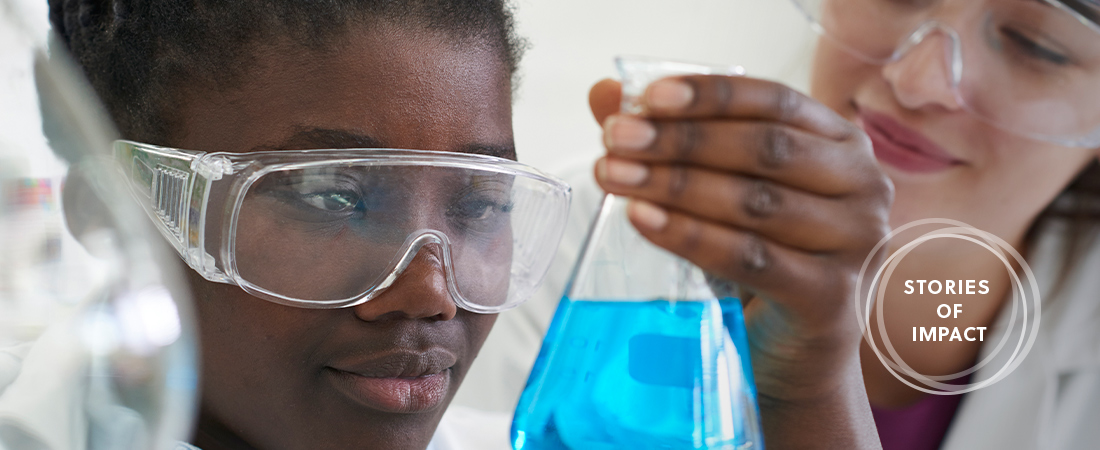Bringing Biotech Learning to East Boston High School Students

East Boston, Massachusetts, is a diverse urban neighborhood where residents endure the daily rattle and roar of aircraft from nearby Logan International Airport. Standing the test of time is East Boston High School (EBHS), a brick structure built in the 1920s—a testament to the city’s promise to provide a quality education.
Within those historic walls, students from “Eastie High” are getting a cutting-edge education. Many are studying biotechnology in science class; some are even participating in the school’s new biotech careers pathway. It’s an introduction to the biotech industry in Boston and beyond—a fast-growing market that needs more diverse talent in the career pipeline.
The students’ work is part of the Amgen Biotech Experience (ABE), an international program funded by the Amgen Foundation, with direction, curriculum development, and technical assistance provided by EDC. Administered through university and other community-based partners, ABE loans research-grade equipment and supplies to high school science teachers to conduct advanced science labs. Students get hands-on experience conducting biotech experiments to learn about human genetics and microorganisms.
“Students gain confidence to unleash their inner scientist,” says EBHS science director and biology teacher Amanda Dillingham. “They unlock their own potential to study science in high school, college, and beyond—to pursue the many career opportunities in the booming biotech industry.”
In one experiment, students work with pipettes to examine DNA obtained from their own cheek cells, isolating the gene that determines who loves and who hates cilantro (based on their ability to taste the synthetic compound PTC). Students learn about core technologies used by scientists in the discovery of human therapeutics, developing critical laboratory skills to better understand the impact of biotechnology—now and in the future.
What’s more, they learn to see themselves as scientists.
“The ABE program has exposed students to possibilities. Without that exposure, they wouldn’t dream of becoming a biotechnician or working in a pharmaceutical company,” says Dillingham.
This is important for East Boston, where nearly 53 percent of residents are Hispanic or Latinx—groups that have long been underrepresented in STEM careers.
Opening doors to STEM careers
Founded in 1990, the Amgen Biotech Experience brings biotech learning to high school classrooms in North America, Europe, and Asia Pacific—including to schools in underresourced communities. By providing teacher training, curriculum materials, and lab equipment free of charge, the program empowers teachers to expose students to biotechnology research. Each year, over 90,000 students and 1,500 science teachers participate in the United States and globally. ABE partners with universities and scientific organizations around the world to make this learning possible. Program leads based at the partner organizations provide professional development and in-class assistance to participating teachers and schools in their regions.
During the 2014–2015 school year, Dillingham introduced the ABE program to her 10th–12th grade biology classes. She received technical assistance and teaching support from Alia Qatarneh, the Massachusetts ABE program lead. Qatarneh is also a Harvard University molecular biologist, researcher, educator—and Eastie native.
“When I had the opportunity to bring biotech learning to teachers and students in East Boston, I jumped at the chance,” Qatarneh says. “I’m in a position to give back to students who grew up on the same street as me.”
Together, Dillingham and Qatarneh have created an excitement at EBHS for studying biotechnology, introducing students to biotech careers through industry partners such as Vertex Pharmaceuticals, Genzyme, Massachusetts General Hospital, and Indigo, a company dedicated to sustainable agriculture.
“Prior to ABE, I didn’t have the materials to show students what biotech was,” Dillingham says. Now, students are putting on lab coats and safety glasses, handling micropipettes, and conducting trial-and-error experiments in a safe, controlled space.
Creating a community of biotech champions
After the first group of EBHS students got a taste of biotech science, more students showed an interest. Dillingham started with a class of 20, and now 200 students per year engage in the program. Demand was so great, Dillingham and Qatarneh trained other teachers to offer ABE labs in their classrooms, such as biology teacher Brad Lepak.
“Our students experience the actual applications of science,” says Lepak. “They can think about whether this is something they want to do for the rest of their lives.”
With a biotech foundation in place, Dillingham was able to obtain additional grant funding from nonprofits and industry to build a fully functional biotechnology laboratory at Eastie High. This enabled them to establish a biotechnology career pathway for students, with opportunities for internships.
“Our school has a zest and energy for science, and we’re running with it,” Dillingham says. As an example, this past summer, five students completed their paid internships and capstone projects remotely at Vertex Pharmaceuticals.
Qatarneh and Dillingham are part of a growing community of ABE biotech education champions. “We’ve been introduced to a community of biotech teachers across the country,” Dillingham says. “The support and expertise we all share is incredible.” Each year, Qatarneh brings the region’s teachers together for ABE professional development at Harvard University.
“Biotechnology is a critical aspect of science—bringing together many disciplines to create solutions to better our world,” says EDC’s Rebecca Lewis, ABE program office director. “In addition, many high school science teachers did not learn biotechnology, and so it is critical for them to receive the professional learning and support to bring it to their students.”
Despite the COVID-19 pandemic bringing uncertainty to the 2020–2021 school year, Qatarneh says the Amgen Biotech Experience will continue running. “It’s forcing us to be on our toes and figure out how to meet the goals of the ABE program remotely,” she says.
Undeterred, Dillingham looks to the future. “Before the ABE program, our students didn’t know what a micropipette was,” Dillingham says. “Now, they can be on a level playing field with other students when they enter college. ABE has served as a springboard for their careers in science. It makes them feel like, ‘I belong here.’”
